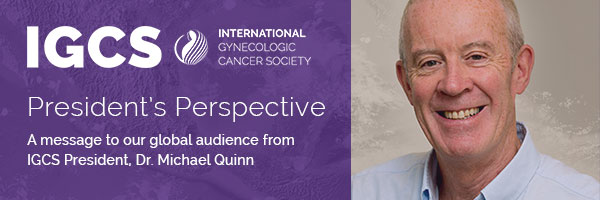
Dear Colleagues,
Two months ago, I was privileged to speak at the 2017 meeting of the Royal College of Obstetricians and Gynaecologists’ (RCOG) in Cape Town about our global curriculum and training programme. At the same meeting, our former President, Lynnette Denny gave a wonderful plenary lecture highlighting the huge health care inequalities between the first and third worlds and emphasised that a diagnosis of cervical cancer, the leading cause of death of women from cancer in emerging countries, leads to loss of employment and income and a major deterioration of living standards.
Since few countries have a nationalised health system, payment for cancer care further pushes women and their families into severe poverty with a significant increase in food insecurity, loss of housing and major absences of children from school. And we all know that education is really the best tool to lead children out of poverty.
In many poor communities, the death of a mother is a major determinant of survival of her infants and children. One telling statistic from Bangladesh noted that cumulative survival from birth to 10 years was only 24% in families where the mother died before the child’s 10th birthday vs. 89% in those whose mothers did not die. How can we not be moved?
Lyn described cancer care in developing countries as ‘abysmal’ and unrecognised as a public health problem. In Africa the incidence to mortality ratio of cancer is 80% compared with 36% in wealthy countries. She highlighted lack of health care and training as important contributors to this awful statistic.
Tanzania is another example where lack of trained personnel and lack of equipment leads to desperate outcomes. For over 20,000 new cases of cancer annually there is one medical oncologist, four radiation oncologists, two physicists and an estimated 5 pathologists. Needless to say trained gynaecological oncologists are few on the ground, if at all.
Africa is not alone when we think of these terrible statistics.
So where does IGCS stand in all of this? Do we have a responsibility to try and change this disparity or is it too hard and best dealt with by someone else?
The answer is of course, that as caregivers and global citizens we do indeed have such a responsibility and that we need to show leadership and commitment. We undoubtedly can make a difference in the arena of education and training. After all, our mission revolves around improving outcomes for women with gynaecological cancers through teaching and training.
For us in the first world, it is time to give back.
The best way for us to do this is to support the IGCS Global Curriculum and Mentorship Programme. This programme depends on volunteer mentors being willing to regularly assess our trainees progress online, spend 1-2 weeks over a two-year period visiting them in their own training institutions and being involved in their exit examination.
By ‘twinning’ mentors and their institutions with training sites we hope that an ongoing rapport and willingness to help will make a huge difference to the care of women in under-developed countries.
In the next few months, IGCS will be reaching out to our members to assess just how many will be willing to join this programme and give back. I encourage you to ponder how well-off you really are and have become, often as a result of your professional status. It’s time for a change. It really is time to give back. Let IGCS lead the way. Please.
Sincerely,

Michael Quinn, MA, MGO
2016-2018 IGCS President


